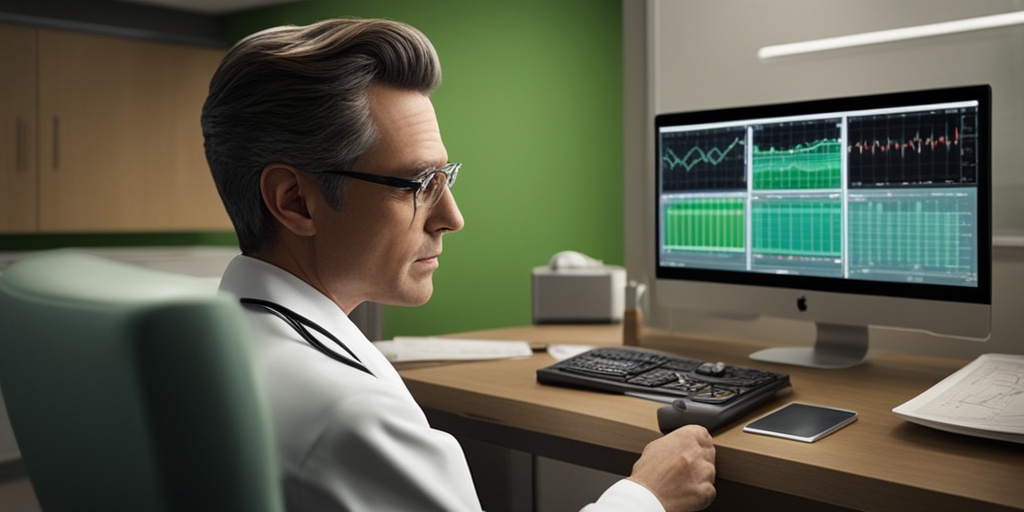What Is Bradycardia?
Have you ever heard of the term “bradycardia” and wondered what it means? You’re not alone! Bradycardia, also known as slow heart rate, is a condition where your heart beats at a rate slower than normal. But what exactly is considered normal, and when should you be concerned about your heart rate?
What Is a Normal Heart Rate?
A normal heart rate, also known as pulse, varies from person to person and can change depending on factors like age, fitness level, and whether you’re at rest or engaging in physical activity. Generally, a normal heart rate for adults is between 60-100 beats per minute (bpm). For athletes or individuals who are physically fit, a normal heart rate can be as low as 40-50 bpm.
What Is Bradycardia?
Bradycardia, on the other hand, is defined as a heart rate of less than 60 bpm. This can be a normal variation for some people, especially athletes, but for others, it can be a sign of an underlying medical condition. Bradycardia can be classified into two types: sinus bradycardia and atrioventricular (AV) block.
Sinus bradycardia is the most common type, where the sinus node, the heart’s natural pacemaker, slows down. This can be a normal response to certain medications, sleep, or relaxation. AV block, on the other hand, occurs when there’s a problem with the electrical signals that control the heartbeat, causing the heart to beat too slowly.
Bradycardia Symptoms
So, how do you know if you have bradycardia? While some people may not experience any symptoms at all, others may notice:
- Fatigue or weakness: Feeling tired or weak, even after resting or engaging in light physical activity.
- Dizziness or lightheadedness: Feeling like you might faint or experiencing a spinning sensation.
- Shortness of breath: Feeling like you can’t catch your breath or experiencing difficulty breathing.
- Chest pain or palpitations: Feeling like your heart is racing, fluttering, or pounding.
- Fainting or near-fainting: Losing consciousness or feeling like you’re about to pass out.
If you’re experiencing any of these symptoms, it’s essential to consult with your healthcare provider to rule out any underlying conditions. They may perform an electrocardiogram (ECG or EKG) to measure your heart’s electrical activity and determine the cause of your symptoms.
Remember, bradycardia can be a normal variation, but it’s always better to be safe than sorry. If you’re concerned about your heart rate or symptoms, don’t hesitate to reach out to a healthcare professional for guidance. And, if you’re looking for evidence-based health answers, consider checking out Yesil Health AI (yesilhealth.com) for reliable information and resources. 💊

Bradycardia Causes and Risk Factors
Bradycardia, also known as a slow heart rate, can be caused by a variety of factors. In this section, we’ll explore the common causes and risk factors associated with bradycardia.
Underlying Medical Conditions
Several underlying medical conditions can contribute to bradycardia. These include:
- Sinus node dysfunction: A condition where the sinus node, the heart’s natural pacemaker, doesn’t function properly.
- Heart block: A condition where the electrical signals that control the heartbeat are blocked or delayed.
- Thyroid problems: An underactive thyroid gland (hypothyroidism) can cause bradycardia.
- Sleep apnea: This sleep disorder can cause bradycardia due to the repeated episodes of low oxygen levels.
- Electrolyte imbalance: An imbalance of electrolytes such as potassium, calcium, or magnesium can affect the heart’s rhythm.
Lifestyle Factors
Certain lifestyle factors can also contribute to bradycardia. These include:
- Athlete’s heart syndrome: Athletes who engage in intense physical training can develop a slow heart rate due to the heart’s adaptation to the physical demands.
- Medications: Certain medications, such as beta-blockers, can slow down the heart rate.
- Aging: As people age, the heart’s natural pacemaker can slow down, leading to bradycardia.
- Genetics: Some people may be born with a slow heart rate due to genetic factors.
Other Factors
In addition to underlying medical conditions and lifestyle factors, other factors can contribute to bradycardia. These include:
- Infections: Certain infections, such as Lyme disease, can cause bradycardia.
- Nutritional deficiencies: Deficiencies in vitamins and minerals, such as vitamin B12 or iron, can affect the heart’s rhythm.
- Hormonal changes: Hormonal changes during pregnancy or menopause can cause bradycardia.
Bradycardia Diagnosis
Diagnosing bradycardia typically involves a combination of physical examination, medical history, and diagnostic tests. Here are the common methods used to diagnose bradycardia:
Physical Examination
During a physical examination, your doctor will:
- Check your pulse to determine your heart rate.
- Listen to your heartbeat using a stethoscope to detect any irregularities.
- Check for signs of underlying medical conditions, such as thyroid problems or sleep apnea.
Medical History
Your doctor will ask you questions about your medical history, including:
- Any symptoms you’re experiencing, such as dizziness or fatigue.
- Any medications you’re taking that could be contributing to bradycardia.
- Any underlying medical conditions you have, such as heart disease or thyroid problems.
Diagnostic Tests
Diagnostic tests may be ordered to confirm the diagnosis of bradycardia and rule out other conditions. These tests may include:
- Electrocardiogram (ECG or EKG): A test that records the electrical activity of the heart.
- Holter monitor: A portable device that records the heart’s rhythm over a 24-hour period.
- Event monitor: A device that records the heart’s rhythm over a longer period, usually 1-2 weeks.
- Stress test: A test that measures the heart’s rhythm during physical activity.
- Blood tests: Tests that check for underlying medical conditions, such as thyroid problems or electrolyte imbalance.
By combining these diagnostic methods, your doctor can determine if you have bradycardia and identify any underlying causes. 💊

Bradycardia Treatment
When it comes to treating bradycardia, the primary goal is to address the underlying cause and alleviate symptoms. In some cases, treatment may not be necessary, especially if the condition is not causing any symptoms or complications. However, if bradycardia is causing dizziness, fainting, or other symptoms, treatment is essential to prevent serious health consequences.
Lifestyle Changes
Before diving into medications and other treatments, it’s essential to make some lifestyle changes to help manage bradycardia. These changes can include:
- Avoiding stimulants: Stimulants like caffeine, nicotine, and certain medications can exacerbate bradycardia. Avoiding or reducing these substances can help alleviate symptoms.
- Getting regular exercise: Regular exercise can help improve overall cardiovascular health and reduce symptoms of bradycardia.
- Managing stress: Stress can worsen bradycardia symptoms. Practicing stress-reducing techniques like meditation, yoga, or deep breathing exercises can help.
- Getting enough sleep: Getting adequate sleep is essential for overall health, including heart health. Aim for 7-8 hours of sleep per night.
Pacemakers and Implantable Devices
In some cases, a pacemaker or implantable device may be necessary to regulate the heart rate. These devices can be programmed to stimulate the heart to beat at a normal rate, alleviating symptoms of bradycardia.
Bradycardia Medications
In addition to lifestyle changes and implantable devices, medications may be prescribed to treat bradycardia. These medications can help regulate the heart rate and alleviate symptoms. Some common medications used to treat bradycardia include:
Beta Blockers
Beta blockers are commonly used to treat bradycardia. These medications slow the heart rate and reduce the force of the heart’s contractions, which can help alleviate symptoms.
Atropine
Atropine is a medication that can increase the heart rate by blocking the action of the vagus nerve, which can slow the heart rate.
Theophylline
Theophylline is a medication that can help increase the heart rate and improve symptoms of bradycardia.
It’s essential to note that medications should only be used under the guidance of a healthcare professional. They can have side effects and interact with other medications, so it’s crucial to discuss any concerns or questions with a doctor. 💊
In some cases, medications may not be enough to treat bradycardia, and surgery may be necessary. This is typically the case when there is a underlying heart condition that needs to be addressed. 💔

Bradycardia Lifestyle Changes
Living with bradycardia, or a slow heart rate, can be challenging, but making certain lifestyle changes can help alleviate symptoms and improve overall health. While medication and medical interventions may be necessary in some cases, incorporating these changes into your daily routine can make a significant difference.
Exercise Regularly 🏋️♀️
Regular exercise is essential for maintaining a healthy heart rate. Engage in moderate-intensity exercises, such as brisk walking, cycling, or swimming, for at least 30 minutes a day. Exercise can help strengthen your heart and increase its efficiency, which can, in turn, help regulate your heart rate. However, it’s essential to consult with your doctor before starting any new exercise program, especially if you have any underlying medical conditions.
Dietary Changes 🥗
A healthy, balanced diet is crucial for maintaining a healthy heart rate. Focus on consuming foods rich in omega-3 fatty acids, such as salmon and walnuts, which can help reduce inflammation and promote heart health. Increase your intake of fruits, vegetables, and whole grains, and limit your consumption of processed and high-sodium foods. Additionally, stay hydrated by drinking plenty of water throughout the day.
Manage Stress 😌
Stress can exacerbate bradycardia symptoms, so it’s essential to find healthy ways to manage stress. Engage in stress-reducing activities, such as yoga, meditation, or deep breathing exercises. Take breaks throughout the day to relax and recharge, and prioritize getting enough sleep each night.
Avoid Stimulants ☕️
Certain stimulants, such as caffeine and nicotine, can slow down your heart rate even further. Limit your consumption of coffee, tea, and energy drinks, and avoid smoking and using other tobacco products. These substances can also increase your blood pressure, which can worsen bradycardia symptoms.
Get Enough Sleep 😴
Aiming for 7-8 hours of sleep each night is crucial for maintaining a healthy heart rate. Lack of sleep can disrupt your body’s natural rhythms, leading to a slower heart rate. Establish a consistent sleep schedule, create a relaxing bedtime routine, and avoid screens and stimulating activities before bedtime.
Bradycardia Complications
While bradycardia is generally not life-threatening, it can lead to complications if left untreated or if underlying conditions are not addressed. It’s essential to be aware of these potential complications and seek medical attention if you experience any symptoms.
Fainting or Dizziness 🤯
If your heart rate is too slow, it may not be able to pump enough blood to your brain, leading to fainting or dizziness. If you experience frequent episodes of fainting or dizziness, seek medical attention immediately.
Fatigue and Weakness 💔
Bradycardia can lead to feelings of fatigue and weakness, making it challenging to perform daily activities. If you experience persistent fatigue, it’s essential to consult with your doctor to rule out any underlying conditions.
Shortness of Breath 👅
In some cases, bradycardia can lead to shortness of breath, especially during physical activity. If you experience shortness of breath, chest pain, or discomfort, seek medical attention immediately.
Heart Failure 💔
In severe cases, bradycardia can lead to heart failure, which can be life-threatening. If you experience symptoms such as swelling in your legs, ankles, and feet, or difficulty breathing, seek medical attention immediately.
By making lifestyle changes and being aware of potential complications, you can effectively manage bradycardia and improve your overall health. Remember to consult with your doctor before making any significant changes to your lifestyle or treatment plan.

Frequently Asked Questions about Bradycardia (Slow Heart Rate)
Below are some of the most commonly asked questions about bradycardia, a condition characterized by a slow heart rate.
What is the difference between bradycardia and slow heart rate?
Bradycardia and slow heart rate are often used interchangeably, but technically, bradycardia is a medical term that refers to a heart rate that is below 60 beats per minute (bpm). A slow heart rate, on the other hand, is a more general term that can refer to any heart rate that is slower than normal.
Is sinus bradycardia the same as bradycardia?
Sinus bradycardia is a type of bradycardia that occurs when the sinus node, the heart’s natural pacemaker, slows down. It is a common and usually benign condition, but it can be a sign of an underlying medical condition in some cases.
What are the symptoms of bradycardia?
The symptoms of bradycardia can vary from person to person, but common symptoms include:
- Fatigue or weakness
- Dizziness or lightheadedness
- Fainting or near-fainting
- Shortness of breath
- Chest pain or discomfort
Can bradycardia be treated?
Yes, bradycardia can be treated, and the treatment approach depends on the underlying cause of the condition. In some cases, bradycardia may not require treatment, but in other cases, medications, lifestyle changes, or even a pacemaker may be necessary.
Can I take melatonin with bradycardia?
It is generally recommended to consult with a healthcare provider before taking melatonin if you have bradycardia, as it can interact with certain medications and worsen the condition.
Is bradycardia related to high blood pressure?
Bradycardia and high blood pressure are two separate conditions, but they can be related in some cases. For example, some medications used to treat high blood pressure can cause bradycardia as a side effect.
Can bradycardia cause seizures?
In rare cases, bradycardia can cause seizures, especially if it is severe or if it is caused by an underlying medical condition such as a heart block.
What is the prognosis for bradycardia?
The prognosis for bradycardia depends on the underlying cause of the condition and the severity of the symptoms. In general, bradycardia can be managed with treatment, and many people with the condition can lead normal, active lives.
We hope this FAQ has been helpful in answering some of your questions about bradycardia! 💖




